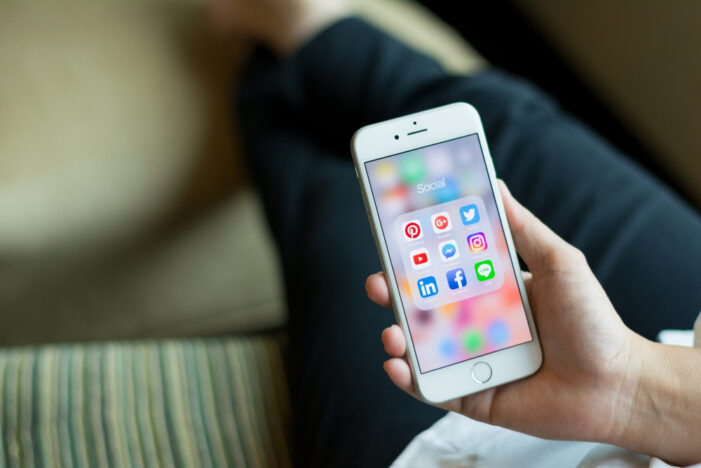Participants to Include Representatives from Government, Academia, Advocacy, Youth Work, as Well as Young People
Summit with Health Department Aims to Develop Shared Understanding of Social Media’s Impact on New York City Youth, Identify Areas for Action
Editorial credit: BlurryMe / Shutterstock.com
NEW YORK – New York City Mayor Eric Adams and New York City Department of Health and Mental Hygiene (DOHMH) Commissioner Dr. Ashwin Vasan today announced that the Adams administration will host a high-level summit on social media later this week — assembling national experts to lay out potential pathways for action to protect the mental health of children and youth who use social media regularly. The summit will include representatives from government, academia, advocacy, and youth work, as well as young people themselves, as they discuss strategies to minimize the devastating impact on mental health.
“Social media may have the ability to connect us together, but unfettered access is hurting our children — encouraging them to steal cars, ride on top of subways, spread hate, and risk their lives, all while ruining their self-worth and robbing them of crucial face-to-face interactions with their peers,” said Mayor Adams. “That’s why we’re convening this summit, so we can get everyone together in one room to discuss the real impacts of social media and avoid its pitfalls.”
“Social media can be a powerful tool to help us stay informed and to connect us with new networks around the world. However, it can also be pernicious to our emotional and mental health as we may compare ourselves in unhealthy ways to others or receive hurtful comments,” said Deputy Mayor for Health and Human Services Anne Williams-Isom. “This is magnified for young people, many of whom spend hours a day on these platforms. Young people are not as equipped to manage these stressors and are more susceptible to platforms we know are designed to keep you on them for as long as possible. This summit, bringing together parents, guardians, young people, academics, practitioners, and advocates, will help us set a path ahead to support our young people and help us set some guardrails to ensure we center their well-being in every discussion.”
“Unfettered, unregulated access to social media is a toxin, and a public health crisis, with risks of serious harm for the mental health and wellbeing of our youth,” said DOHMH Commissioner Dr. Ashwin Vasan. “Social media is fundamentally not designed for children or with their health and wellness in mind, even if some young people can form positive connections online. We don’t have all the answers, but public health offers the solutions — through education and prevention, harm reduction, and regulation — that can keep our kids safe. As a father and as the city’s doctor, I expect nothing less of us as community, and the time to act is now.”
“The most common question parents ask me is, ‘is social media safe for my kids?’ The answer is that we don’t have enough evidence to say it’s safe, and, in fact, there is growing evidence that social media use is associated with harm to young people’s mental health,” said U.S. Surgeon General Dr. Vivek Murthy. “Children are exposed to harmful content on social media, ranging from violent and sexual content, to bullying and harassment. And for too many children, social media use is compromising their sleep and valuable in-person time with family and friends. We are in the middle of a national youth mental health crisis, and I am concerned that social media is an important driver of that crisis — one that we must urgently address.”
More than 120 participants are invited to the gathering hosted at a space donated by the Rockefeller Foundation to discuss topics ranging from research and evidence surrounding social media use for young people to opportunities for local leadership, as well as policy and advocacy. The participants were selected based on their work on youth, mental health, and social media.
The summit was first announced in March as one of the strategies included in “Care, Community, Action: A Mental Health Plan for New York City.” It also follows a report from the U.S. Surgeon General Murthy that recognized potential harms to young people due to social media, and is the first stake in the ground towards a longer-term citywide strategy to address social media as a potential public health threat.
The summit also comes amid a growing need to provide services, as well as to identify threats to young people’s wellness. For example, in 2021, 38 percent of New York City high schoolers reported feeling so sad or hopeless almost every day for at least two weeks during the past 12 months that they stopped doing their usual activities. The same year, 42 percent of Latino/a students and 41 percent of Black students reported feeling sad or hopeless, compared to just under 30 percent of white students. Additionally, over the past 10 years, rates of suicidal ideation among high schoolers increased by more than 34 percent.
Mayor Adams’ mental health plan lays out additional strategies to promote the mental health of young people, including a digital mental health program for New York City high school-aged teens, a suicide prevention pilot programming at NYC Health + Hospitals for youth entering emergency departments for suicide attempts, and DOHMH-led community-based suicide prevention programming to specifically serve Black and Brown youth.
New Yorkers in need of support can receive free assistance by calling 988

